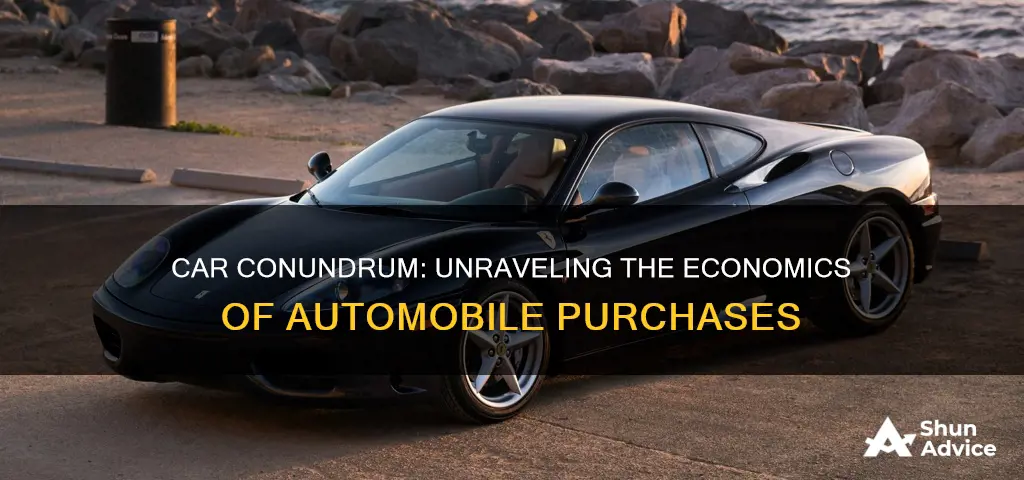
In macroeconomic terms, an investment is defined as spending on capital equipment, inventory, structures, and new homes. This includes spending by firms on items such as machinery, assembly lines, and inventory, as well as the construction of new homes by households. However, the purchase of an existing home or other assets, such as a car, is not considered an investment in the same way.
While a car can be considered an asset, as it holds monetary value and can be converted to cash, it is not typically viewed as an investment. This is because cars generally lose value over time due to depreciation, with some sources stating that a car can lose up to 20% of its value in the first year of ownership. As a result, buying a car is often viewed as a liability rather than an investment, as it is unlikely to provide a financial return and can be costly to maintain.
However, it is important to note that a car can still provide value to an individual's life by increasing their employability and quality of life. Additionally, in certain cases, such as using a car for business purposes, it may be possible to generate revenue that offsets the costs of ownership.
| Characteristics | Values |
|---|---|
| Considered an investment | No |
| Increase in value | No |
| Depreciation | Yes |
| Essential for quality of life | Yes |
| Essential for employability | Yes |
| Average annual cost of ownership | $10,738 |
| Average cost of a new car | $48,275 |
| Average cost of an electric vehicle | $55,089 |
| Average yearly cost of ownership for 15,000 miles | $10,000 |
What You'll Learn

Cars are depreciating assets
A car's value is affected by several factors, including the number of miles driven, its condition, and the costs of maintenance, gas, and insurance. As such, the more you drive your car, the more its value decreases. Additionally, certain models and manufacturers are more susceptible to depreciation.
Despite this, a car can still be considered an asset as it brings value to your life and can be converted to cash. It can improve your quality of life and employability by enabling you to travel for work and recreation. However, it is important to recognise that a car is not an investment in the traditional financial sense, as it is unlikely to provide a good return on investment.
Whole Life Insurance: Paying for Protection or Investing in a Policy?
You may want to see also

Cars are not investments
While a car is necessary for many people, it is typically not a wise financial investment. This is because, unlike stocks, bonds, mutual funds, retirement accounts, or real estate, cars do not appreciate in value over time. In fact, most vehicles rapidly lose value the moment they leave the dealership lot. This rapid depreciation makes buying a vehicle a bad investment option.
According to auto insurance company Progressive, new cars can lose up to 20% of their value within the first year of purchase and another 15% each year through the first four or five years of ownership. By the five-year mark, the vehicle has likely lost roughly half its value. The vehicle's value will typically bottom out after about 10 years.
For example, the car you purchase for $35,000 would be worth about $17,500 after five years and will have lost half its value due to depreciation. This depreciation can be even more extreme for luxury or sports cars, which often have higher price tags and can be subject to greater depreciation rates.
While some classic and luxury cars can appreciate over time, these are the exception rather than the rule. The market for collectible cars is small, and ongoing maintenance costs are typically higher than for traditional vehicles. The high maintenance costs and the difficulty in finding parts for classic cars can eat away at any potential profit.
Instead of an investment, a car is better thought of as an asset or a productive tool. It can help you get to work, run errands, and travel for recreation. It can also be sold for cash in a financial pinch. However, as a depreciating asset, a car is a liability that costs you money over time. The high ownership costs, including gas, maintenance, repairs, insurance, and other expenses, make a car a costly liability.
Mortgage and Markets: Navigating the Investment Landscape
You may want to see also

Cars can be productive assets
While a car is not considered an investment, it can be a productive asset. A productive asset is one that has the ability to generate profits and cash flow. A car is a productive asset as it can help you run errands, drive to work, and travel long distances.
For example, if you're using your car for business purposes, it can generate revenue and tax savings. A reliable vehicle used for business purposes can add to your bottom line. However, it's important to ensure that the vehicle is used efficiently and doesn't incur unnecessary costs. With the right tools, such as an In-Vehicle Monitoring System (IVMS), organisations can improve the productivity of their fleets by identifying idling and under-utilised assets, ensuring maximum utilisation, and improving job dispatch and routing.
Additionally, a car can be a valuable asset for family life, extended travel, and cargo transportation. It can provide a comfortable ride and make it easier to handle family and friends, as well as four-legged companions.
While a car may not be a good financial investment due to its depreciation, it can still be a productive asset that brings value to your life and helps you accomplish various tasks.
Invest 98L: Potential Hurricane Threat or False Alarm?
You may want to see also

Cars can be liabilities
A liability is something that you own that costs you money, and a car certainly fits this description. The costs of owning a car go beyond the initial purchase price. There are also maintenance, fuelling, and other expenses to consider. According to 2022 data from AAA, the average annual cost of owning a mid-priced new vehicle is $10,738. This includes expenses such as gas, maintenance, repairs, insurance, and other costs.
Even if you own your car outright, it can still be considered a liability due to the ongoing costs associated with it. The money spent on maintenance, repairs, and fuel is money that could have been invested elsewhere, potentially earning a return. This opportunity cost further emphasizes the liability nature of car ownership.
Additionally, cars require regular maintenance to function properly and maintain their value. This includes routine services, oil changes, and repairs, all of which can be costly. These maintenance costs contribute to the overall liability of owning a car.
The value of a car also depends on its overall mileage and condition. The more miles driven, the lower the value, and any damage or wear and tear will further reduce its worth. This depreciation in value means that a car is unlikely to provide a financial return when it comes time to sell.
While a car can be essential for transportation and improving quality of life, it is important to recognize its liability nature from a financial perspective. The ongoing costs, maintenance requirements, and depreciation in value make cars a liability for their owners.
Retirement Redefined: Exploring the Post-Banking Lives of Investment Veterans
You may want to see also

Cars can be used as collateral
While a car is not considered an investment, it can be used as collateral for a loan. This means that a lender can repossess your car if you default on the loan. Using your car as collateral can have its benefits, such as:
- Easier to qualify for a loan: Due to the added security lenders gain from collateral, secured loans are typically much easier to qualify for than traditional personal loans.
- Lower interest rates: Secured loans typically have lower interest rates available.
However, there are also drawbacks and risks associated with using your car as collateral:
- More likely to be upside down: There is an added likelihood that you could become upside down, or have negative equity, because you are adding more to the amount you already owe.
- Potential for repossession: If you default on your loan, the lender can repossess your car, and your credit score will be negatively impacted.
There are two main types of loans that use your car as collateral: auto equity loans and car title loans. Auto equity loans allow you to borrow money against the value of your car, while car title loans typically have a shorter term (15-30 days) and higher interest rates. When considering a loan with your car as collateral, it is important to shop around for the best lender and loan terms and be aware of the potential consequences of defaulting on the loan.
Invest Now: Where to Put Your Money
You may want to see also
Frequently asked questions
No, buying a car is not considered an investment in macroeconomics. This is because a car is not expected to increase in value but rather depreciates over time.
A car is not considered an investment because it depreciates in value. A car's value decreases over time due to various factors such as miles driven, accidents, and general wear and tear.
Yes, rare and exotic cars, such as classic cars, may increase in value over time as they become rarer. However, these cars are not typically considered a wise investment strategy due to the unpredictable nature of the market and the high maintenance costs associated with classic cars.
A car is considered a depreciating asset or a liability. This is because, despite losing value over time, it still holds some worth and can be converted to cash.







